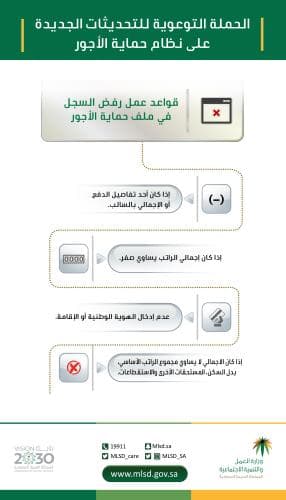WMS new rules aim to monitor payroll release in private sector: MLSD
Publication date: 21 September 2022 - 25 Safar 1444
Spokesman of the Ministry of Labor and Social Development Khaled Abalkhail said the first phase of applying new updates on the Wage Management System’s rules aims to create a safe and suitable work environment in the private sector as it will increase transparency, protect the rights of involved parties.
Abalkhail added the system monitors payroll process for male and female workers working in the private sector (Saudi nationals and expats) and assess employers’ keenness to pay wages on time and with the agreed amount, as well as reduce labor disputes between the establishments and the workers.
Previously, the ministry launched the first phase of the new-updated system to reflect compliance rate of establishments and send alerts to violators as the uploaded wage files are immediately subject to these new rules.
The spokesman pointed out the new updates of WMS allow establishments to check if their wage records are approved via the website, review the month and type of violation occurred and show file status for the current month/last six months.
Abalkhail clarified the newly-updated system rejects wage files that are changed after receiving them from the bank, as well as those that have no or invalid unified number of establishment along with rejecting those paid in other currencies rather than Saudi Riyals.
He stressed the ministry puts forward a user guide on the WMS’s website that can be accessed through its portal (https://www.mol.gov.sa), stressing whoever fails to follow the specifications of the system, their submitted wage files will be completely rejected.
Additionally, the files get rejected if the total payments are not equal to the basic salary, housing allowance, other benefits and deductions, as well as if payment details or total payroll are found negative or zero, or else worker’s national IDs or Iqama are wrong.
The ministry emphasized its keenness to protect rights of involved parties and penalize those who fail to correctly upload the wage files, pointing out compliance rate of establishment is reduced due to the number of violations and employer’s failure to provide a reasonable explanation to the labor inspector.
The establishment is also penalized if it pays the worker more than once in the same month as the WMS excludes the repeated files for the same worker, in addition to establishment’s failure to pay the worker on time.
The establishment is penalized if it deduces more than 50 percent of worker’s basic salary that is registered under GOSI. It is also penalized if the worker’s basic salary is not equal to what is registered under GOSI.
The ministry highlighted that the new changes of the WMS assess employer’s compliance through comparing the number of workers whose wages are forwarded to the system with the total number of workers in the establishment registered under GOSI.
The expat worker is not counted as part of the compliance rate of the establishment within 90 days from the date of his/her arrival to the Kingdom, whereas the Saudi worker is counted when s/he shows up to work for a period of one month.
According to the WMS new rules, the ministry stops services to establishments failing to comply with the system and upload the wage files on time after being warned.